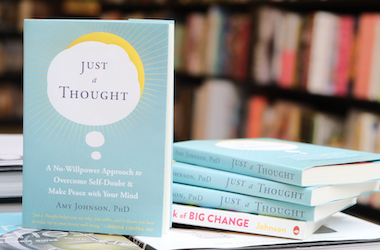Ours is not a model of mental health but one of mental dis-ease, focusing on where there is a lack of ease, glossing over the billions of things that are going right to look at what appears to be going wrong. Because the medical model has been applied to the human mind (in the west, anyway) for as long as we can remember, it is easy to assume that’s the way it truly is.
But what if there is a different answer to the mental health “problems” we see so often? What if those problems are not problems at all; what if they are the natural, healthy function of the mind doing exactly what it was designed to do?
What if mental disease and disorder have simply been misunderstood for a really long time?
Ten Big Ideas about Traditional Psychology and Mental Health (please note that these are very abbreviated summaries of each point. Please check out the 30 min class for a more detailed explanation of these ideas.)
1. You are fundamentally mentally healthy
Yes, I can say that with complete confidence that it applies to anyone who may be reading this, no matter what state you find yourself in at the moment. At your core is an endless supply of mental health and wellbeing. When you’re not feeling it, you’re simply lost in thought. Your mental health never goes anywhere, it only becomes covered with thought.
2. Problems don’t need to be figured out
Therapy culture has taught us that analysis and introspection are essential; that they are perhaps the only way of feeling better in the present and moving forward unencumbered.
But what if ‘happy’ is what you already are when you’re not thinking so much? If a mind that is free of thought feels good, adding more thinking in the way of analyzing and trying to figure things out would actually have the opposite effect, wouldn’t it?
3. Revisiting the past is not always necessary
The pain of the past is over unless you are thinking about it today. If a person who says they are depressed is laughing, are they depressed in that moment?
They will often say they are. They say, “I’m laughing now, but you should see me later. I’ll be a mess.” Or, “I’m laughing now, but the past still happened or my brain chemistry is still off and I’ll return to depression when the joke is over.”
And they do, but mostly because they believe they will. They hang on to thoughts that make them depressed, because they innocently believe that is the way their mind works. When they learn otherwise, the past lingers far less.
4. Going back into old pain does not solve the pain
Doesn’t it sound a little counterintuitive to bring old pain back up in order to rid yourself of it?
Pain doesn’t need to be solved. It’s not a problem to fix, it’s a temporary, thought-created experience. When you see that the only time you’re experiencing pain is when the pain is on your mind, and that thoughts come and go on their own all the time, there is nothing do.
5. People get better
There are countless cases of “spontaneous recovery” from nearly every known mental issue. In some studies, people who didn’t receive traditional psychological help recovered over the long term at the same or even higher rates as people who did receive treatment.
The human psyche is incredibly resilient. How can be so resilient? Because it’s never broken to begin with. If the only “problem” is that you’re lost in thought masquerading as reality, the only “fix” is to let that thought to clear.
6. Out past does shape us, but only if we believe it does
It’s hard to argue with the fact that people find themselves shaped by their experiences in life. The certainly do.
But you’ve also no doubt noticed that some experienced don’t make a mark. Traumas you’d think would affect you for years don’t, and vice versa.
Our current moment thinking is the only thing we ever directly feel. When we expect circumstances and events to affect us, they often do, but only because they are on our mind.
7. The feeling is all that matters
When you are feeling content and peaceful, you are well. You’re not in denial…it’s not that your problems are in the background waiting to pounce on you at when your guard is down…when you are mentally at peace, you have no problems.
Your feelings will always show you how much is on your mind. If you’re not feeling peaceful and content, just wait. Thought will clear and when it does, you’ll feel healthy again.
8. Wisdom and common sense will tell you what to do
We are constantly trying to solve problems we don’t need to solve. We’ve been told that our power is in our intellect, so of course we’d turn there for help.
But we all have access to power far greater than human intellect: our wisdom and common sense. When your mind quiets down a bit, that wisdom is easy to hear. It will tell you exactly what to.
9. Relapse and setbacks
It’s natural to fall back into old patterns and habits. Well-practiced, often-paid-attention-to thought can be sticky. It pops up often, even when it’s been away for a while.
And our ability to see that thought as only thought–not reality–waxes and wanes. Sometimes we remember, other times we forget.
But when we know this is all that’s going on, it becomes much harder to get bent out of shape about what we call relapses and setbacks. If you view a relapse as a moment when you innocently mistook thought for reality, is relapse really so dangerous?
10. The great equalizer
Seeing the truth about thought and our innate mental health has been called The Great Equalizer. We’re all the same. We are all healthy, unbelievably resilient, and designed to thrive. And we all live in a world of thought, where we get temporarily lost in what’s in our heads and appear to lose touch with our fundamental wellness.
That wellness never leaves us though, even when we lose sight of it. It is always there, waiting for our reunion with it when our thoughts slow down. This has nothing to do with your background or your DNA. Innate mental health truly is The Great Equalizer. It applies equally to every human on earth.





